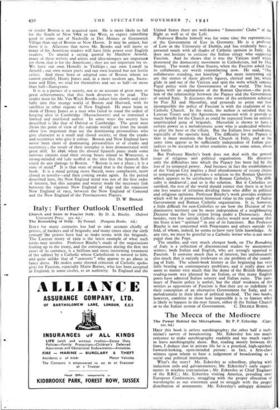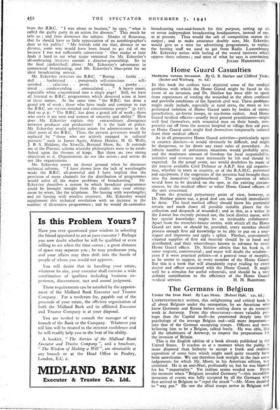The Mecca of the Mediocre
The Power Behind the Microphone. By P. P. Eckersley. (Cape. los. 6d.)
HALF this book is artless autobiography; the other half a tech- nician's survey of broadcasting. Mr. Eckersley has too much reticence to make autobiography readable and too much vanity to leave autobiography alone. But, reading mostly between the lines, I deduce that in private life he is a practical, high-spirited, forward-looking, open-minded person: in fact, a first-class witness upon whom to base a judgement of broadcasting as a social and political institution.
What's the story? Mr. Eckersley as schoolboy, playing with induction coils and galvanometers; Mr. Eckersley's early experi- ments in wireless transmission ; Mr. Eckersley as Chief Engineer of the B.B.C.; Mr. Eckersley visiting America, presiding over European Conferences, struggling with the proper allocation of wavelengths as our statesmen used to struggle with the proper distribution of armaments. Mr. Eckersley's unhappy dismissal from the B.B.C. " I was about to bedime," he says, " what is called the guilty party in an action for divorce." This much he tells us ; and then dismisses the subject. Shades of Rousseau, that he should have so -little appreciation of an autobiographer's duty to his public! " My friends told me that, divorce or no divorce, some way would have been found to get rid of me because I was not sufficiently subservient ' One reader at least finds it hard to see what scope remained for Mr. Eckersley's all-embracing interests outside a director-generalship. So to the final .(unfinished) phase : Mr. Eckersley's adventures in commercial broadcasting, and Mr. Eckersley's blue-print for an ideal broadcasting service.
Mr. Eckersley criticises the B.B.C. " Boring . . . feeble . . .
dull . . . hackneyed . . . pompously self-conscious . . self- satisfied . . . salacious . . prosy . . . whining . . . pawky . . . timid . . . condescending . . . emasculated. . . ." A heavy count, especially when concentrated into a single page! Still, we have all listened to B.B.C. programmes which deserved some at least of these names. At the same time " the B.B.C. has done a grand job of work ; those who have made and continue to run the B B.C. are serious-minded and conscientious people " (p. 157). And on p. 9: " The B.B.C. has done a grand job of work ; those who serve it are men and women of sincerity and ability." How does Mr. Eckersley explain this extraordinary divergence between producer and production? It is the fault of policy. Mr. Eckersley would substitute artists for administrators in the chief posts of the B.B.C. Thus, the present governors would be replaced by " those who are actively engaged in cultural pursuits " such as James Agate, Aldous Huxley, H. G. Wells, J. B. S. Haldane, the Sitwells, Bernard Shaw, &c. It reminds me of the Platonic scheme whereby philosophers were to be estab- lished upon the thrones of kings. But there arc two strong objections to it. Organisations do not like artists ; and artists do not like organisations.
Mr. Eckersley seems on firmer ground when he discusses technical reforms. " I have shown how the lack of wavelengths made the B.B.C. all-powerful and I have implied that the provision of more channels for the distribution of programmes would solve all the major problems of broadcasting." Mr Eckersley describes a system by which broadcast programmes could be brought straight from the studio into your sitting- room by wires, like the telephone. No fussing with wavelengths; and no fussing with wireless receivers. Mr. Eckersley would supplement this technical revolution with an increase in the number of alternative programmes ; and he would de-centralise
broadcasting root-and-branch for this purpose, setting up six or seven independent broadcasting headquarters, instead of one, as at present. Thus would the salt of competition season the output ; and to make assurance doubly sure, Mr. Eckersley would give us a wire for advertising programmes, to replace the bootleg stuff we used to get from Radio Luxembourg. Mr. Eckersley writes with feeling of the vested interests which oppose these reforms ; and most of what he says is convincing.
JULIAN HAMMERSLEY.























 Previous page
Previous page